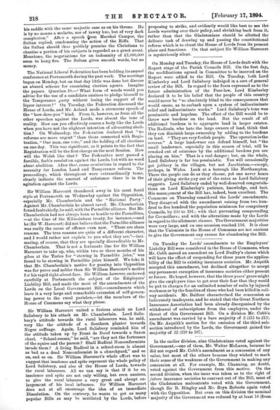On Monday and Tuesday, the House of Lords dealt with
the Report stage of the Parish Councils Bill. On the first day,. the modifications agreed in Committee to be inserted en the Report were added to the Bill. On Tuesday, both Lord Kimberley and Lord Salisbury indulged in a sort of general review of the Bill. In regard to the fears expressed as to the future administration of the Poor-law, Lord Kimberley' declared it to be his belief that the people of this country would never be "so absolutely blind to the consequences that would ensue, as to embark upon a system of indiscriminate relief and indiscriminate works." Lord Salisbury's tone was' pessimistic and hopeless. The effect of the Bill would be to throw new burdens on the land. But the result of all additional burdens is to aggregate land in larger estates. The Radicals, who hate the large owners of land, think that they can diminish large ownership by adding to the burdens on land. "They are very foolish people. The operation is the reverse." A large landowner can defend himself, but " the small landowner, especially in this season of trial, will be crushed out of existence by the additional burdens you are- placing on him." That is a real danger; but, on the whole, Lord Salisbury is far too pessimistic. You will occasionally get jobbery in the villages, but not Ja,cobinism,—except,. perhaps, in Wales. Look at a borough like Northampton. There the people can do as they choose, yet one never hears of their giving strike-pay out of the rates as Lord Salisbury suggests. Lord Salisbury ended by well-deserved congratula- tions on Lord Kimberley's patience, knowledge, and tact. His management of the Bill has, indeed, been excellent. The Commons on Thursday considered the Lords' amendments. They disagreed with the amendment raising from two hun- dred to five hundred the population minimum for compulsory Councils, by 260 to 191; with that preventing compounding for Councillors; and with the alterations made by the Lords in regard to the allotment clauses. The Government majorities were very large, and on one occasion reached 116. It is clear- that the Unionists in the House of Commons are not anxious to give the Government any excuse for abandoning the Bill.






































 Previous page
Previous page